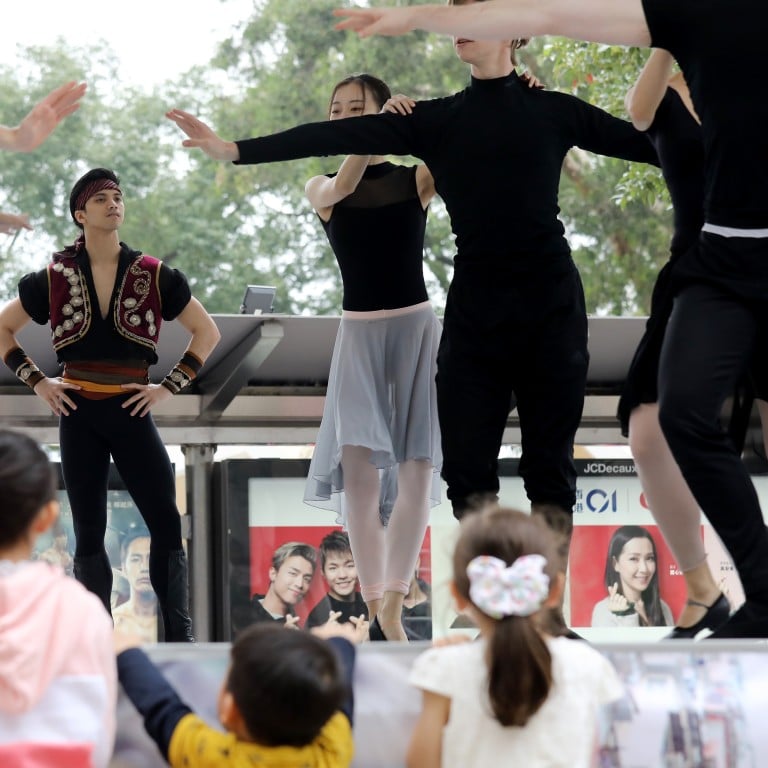
Domestic helpers in Hong Kong applaud arts outreach and seize chance to show their creativity
- Ballet in the City, a series of pop-up performances, is bringing ballet to Hong Kong’s domestic helpers for whom the usual price of a ticket is out of reach
- It is one of a growing number of examples of the city’s arts community supporting domestic helpers and highlighting their lives
It is a hot and steamy Sunday afternoon in March but Garry Corpuz – a shining light in the Hong Kong Ballet – is not sweating it as he gracefully leaps across a makeshift stage outside Statue Square in Hong Kong’s busy Central business district.
Also on stage is Luis Cabrera. Both have principal roles in the company’s latest production, the swashbuckling ballet Le Corsaire, a tale of dashing pirates, bumbling pashas and beautiful harem girls that is based on The Corsair by British poet Lord Byron.
Both also hail from the Philippines, so it is not surprising that the hundreds who have gathered to watch the pop-up performance – mostly Filipinos from the city’s 370,000-strong workforce of domestic helpers – are all smiles. Many domestic helpers gather in the area – and other public spaces in Hong Kong – every Sunday. For most it is their only day off each week, and they come here to talk, eat, dance and listen to music.
The outdoor pop-up performance is part of the Hong Kong Ballet’s community engagement programme, Ballet in the City, which aims to bring dance to all corners of Hong Kong. Another pop-up was staged in Tuen Mun, a remote new town in the New Territories, later in the month.
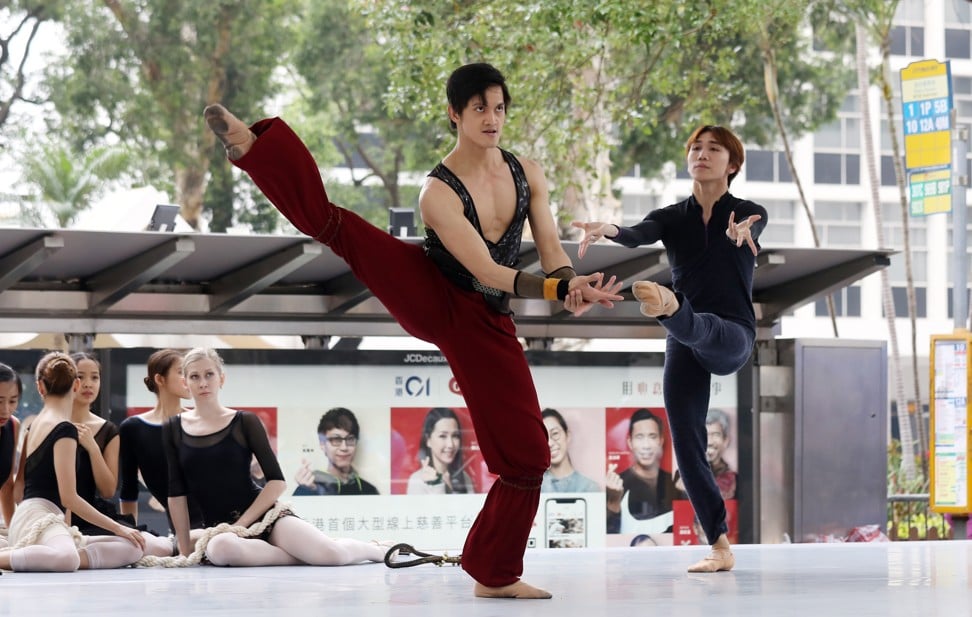
Among the crowd on this Sunday is Maria Reyes, who has come to meet her friends. Dancing is their thing. She has never seen a live ballet performance by a top-class company before – not because she doesn’t like ballet, but because ticket prices are out of her reach.
“I love dance but could never afford to see a live theatrical ballet performance,” says the 35-year-old, who has worked in Hong Kong for the past three years.
How Filipino helpers in Hong Kong spend Christmas, a time tinged with sadness
Like many domestic workers in the city, Reyes sends most of her HK$5,500 (US$700) monthly wage back to her family; she is paid slightly more than the HK$4,520-a-month minimum wage for a domestic worker, but still far less than the average monthly Hong Kong salary of HK$17,500. Her three daughters, aged five, seven and 10, live with their grandparents in Luzon, the largest and most populous island in the Philippines.
It is hard to ignore the huge contribution overseas Filipino workers such as Reyes make to the Philippine economy, or the sacrifices that come with it, with many leaving family behind to work overseas for years at a time.
“To be here today and see the Hong Kong Ballet perform for free is really special and makes me feel more appreciated,” she says.
It is just the sort of reaction the company is looking for.
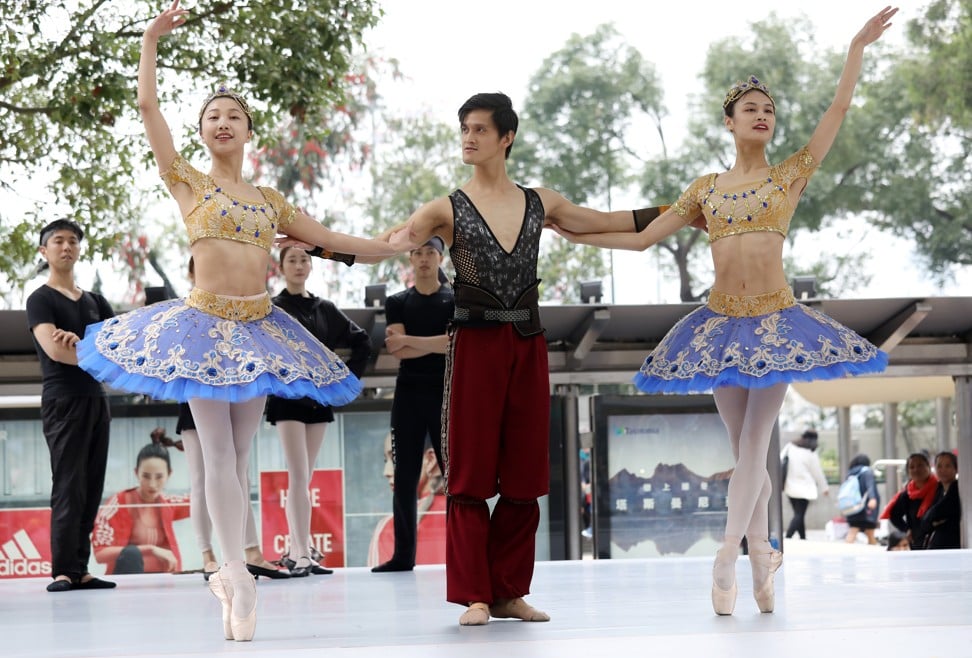
The ballet’s artistic director, Septime Webre, makes a cool statement in his aviators, dragon-emblazoned Kenzo denim jacket and red sneakers as he stands by the pop-up’s stage, proudly watching his troupe in action.
Webre is one of the key forces behind the company’s outreach initiatives, which he says are all about “moving outside the confines of the theatre” while supporting underserved communities. Other events the company has organised include a ballet happy hour at the Asia Society centre in Admiralty, where people can watch a ballet rehearsal and dancers warm up while enjoying a drink; and master classes from top tutors including Yannick Boquin, a graduate of the Paris Opera Ballet School and the National Conservatoire of Paris.
“The idea of these programmes is to activate the city through dance so that people in Hong Kong can view themselves as ballet-goers by stumbling upon dance in the streets,” says Webre, the former artistic director of the Washington Ballet, who joined the Hong Kong Ballet in 2017. “And the Filipino population in Hong Kong helps our city run smoothly; they contribute to the civic life we all enjoy. It’s good to see that the arts are accessible to all members of our society.”
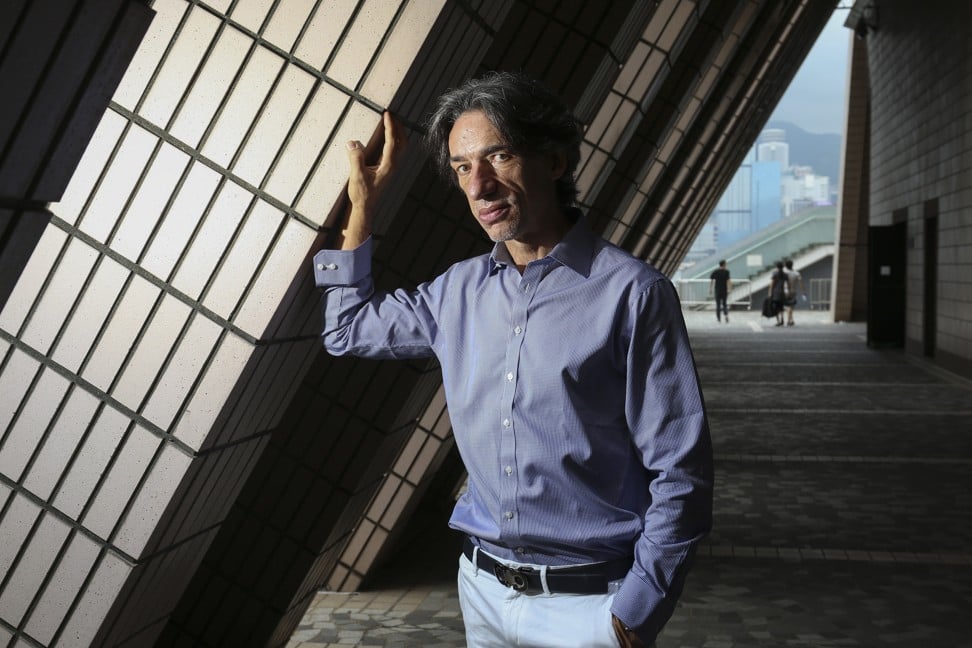
Dance is an important part of Filipino cultural expression, he adds. “You only have to stroll through Central on a Sunday afternoon to see beautiful bodies in motion – dancing is in our DNA.”
The company’s outreach programme is one piece of a bigger jigsaw: it is part of a change in the migrant worker story – more usually focused on exploitation in which they are the victims – that has the support of various sectors in Hong Kong, especially the creative community.
That includes increasing exposure on the big screen, with the release over the past few years of films addressing the plight of domestic workers in the city.
In 2016, the documentary Sunday Beauty Queen, directed by Baby Ruth Villarama, turned the lens on a group of expatriate domestic workers in Hong Kong as they prepared to take part in an annual beauty pageant. The following year, The Helper was released. Directed by British filmmaker Joanna Bowers, it shares the diverse stories of Hong Kong’s migrant domestic workers, exploring their contribution to society in the face of heartbreaking separation from their loved ones.
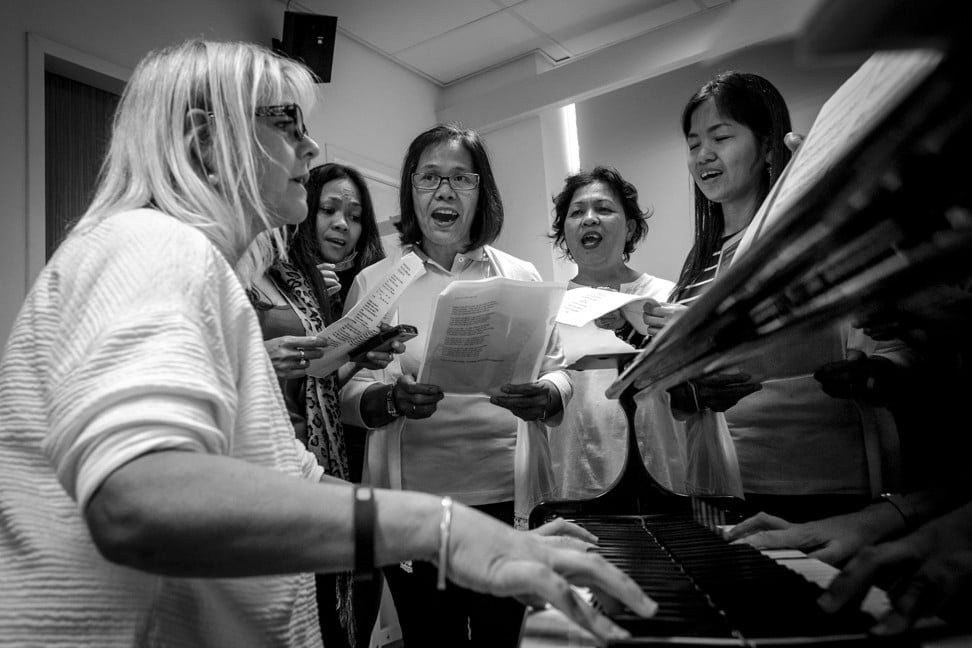
Last year saw the release of Martika by RTHK, Hong Kong’s public broadcasting service. The film followed the story of a Filipino helper struggling to adapt to working for a local family and caring for an elderly man with dementia.
One of the biggest releases was Still Human, an indie film produced by Fruit Chan and directed by Oliver Chan Siu-kuen. It explores the relationship between a paralysed Hong Kong man and his new Filipino domestic worker, who has put her dream of becoming a photographer on hold to come to the city to earn a living.
The film received eight nominations for the upcoming 2019 Hong Kong Film Awards, to be held on April 14, including for best picture and best actor (Anthony Wong Chau-sang, who plays the paralysed man).
One cast member whose name you probably won’t recognise is Crisel Consunji, who plays the domestic worker, Evelyn. The 34-year-old, who had never acted in a film when she was chosen to star opposite Hong Kong cinematic legend Wong, has been nominated in the best actress and best newcomer categories.
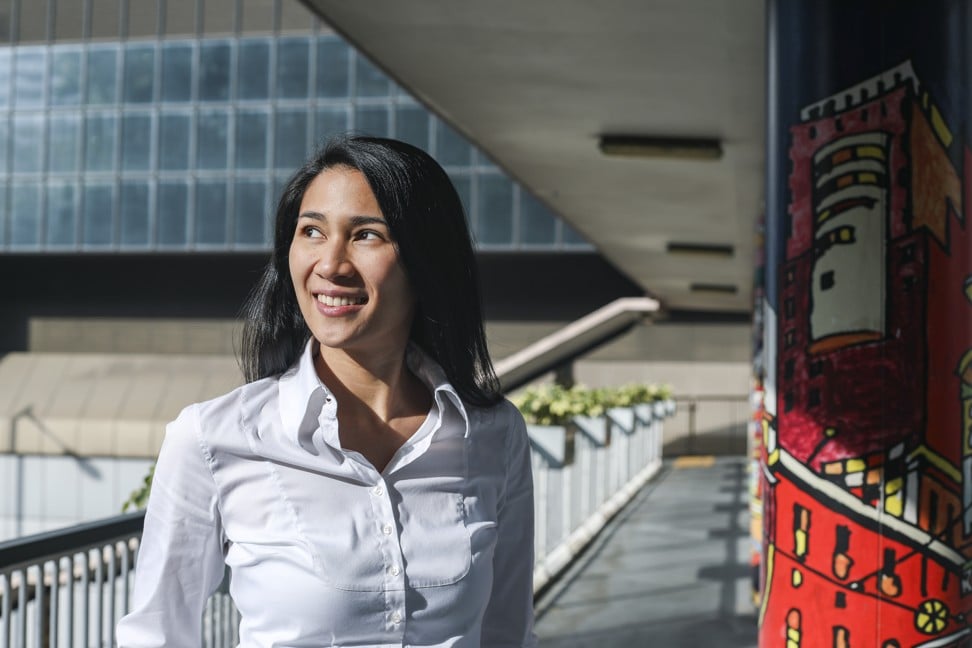
She is, though, a veteran of the performing arts as a stage actress and singer. She trained at the Repertory Philippines in Manila and was 23 when she moved to Hong Kong for a role at Hong Kong Disneyland. She performed for three years there as lead vocalist in productions such as High School Musical and The Golden Mickeys.
One artist who is familiar with the plight of foreign domestic workers is Filipino street and documentary photographer Xyza Cruz Bacani.
Bacani grew up without her mother, Georgia, who left the family in 1996 when Bacani was eight years old to work as a helper in Singapore and Hong Kong. Bacani joined her mother in Hong Kong aged 19 and discovered her passion for photography, which she now does full time.
In her book We Are Like Air, she documents the struggles of migrant workers in Hong Kong and New York, as well as the anguish and hopes of the families they leave behind in the Philippines.
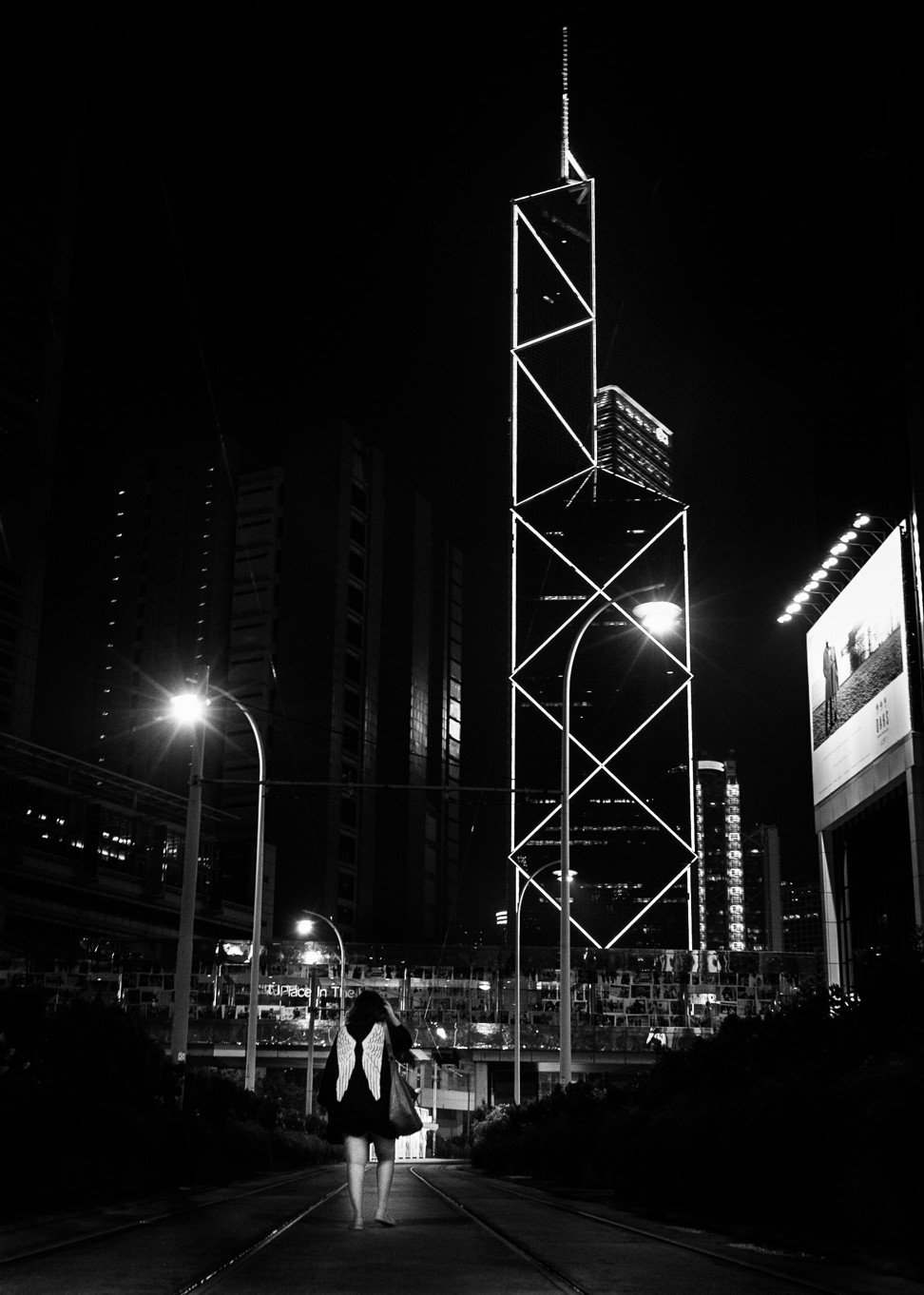
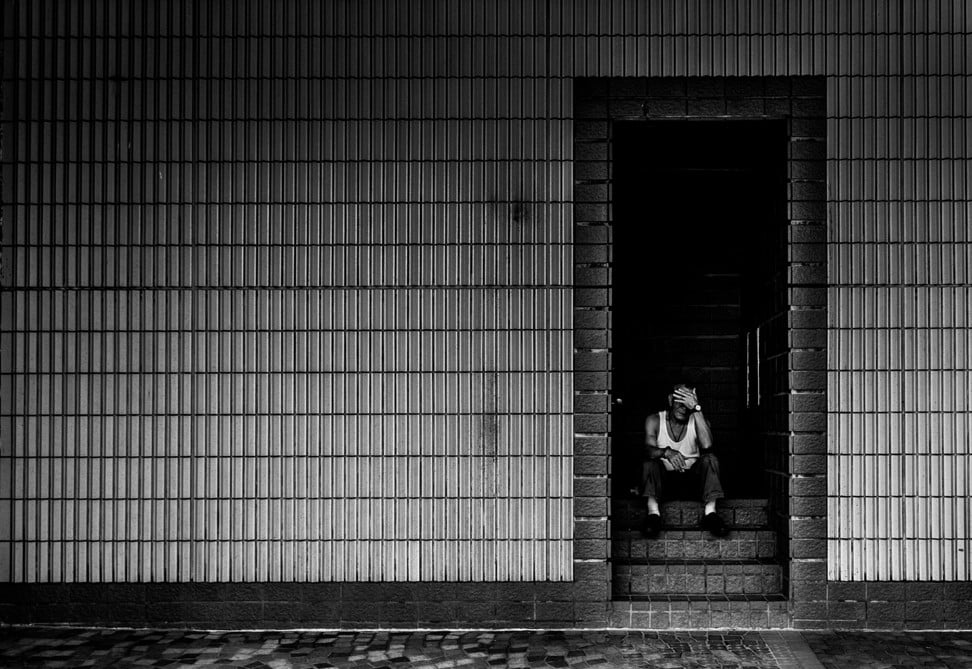
Also raising the profile of overseas workers in the city is migrant Filipino artists group Guhit Kulay, which was established in 2017.
Last year the group staged a show, “Beyond Myself”, at The Hive Spring in Wong Chuk Hang. The show was all about “making domestic workers’ experiences visible by exploring their contributions and sacrifices through language, images and objects produced in their daily lives”, says Zamira Monteiro of Enrich HK, a charity promoting the economic empowerment of migrant domestic workers.
“They are an integral part of our lives, caring for our homes, children and elderly,” Monteiro says.

